It looks like you're using an Ad Blocker.
Please white-list or disable AboveTopSecret.com in your ad-blocking tool.
Thank you.
Some features of ATS will be disabled while you continue to use an ad-blocker.
share:
If it happened before, it'll happen again...
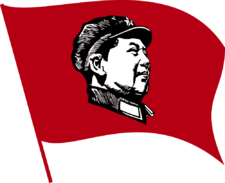
Behold the "Four Olds" aspect of Mao's Cultural Revolution. It was effectively a more grandiose iteration of the Nazi's infamous book burnings style censorship. In China, 1966, Mao (like Hitler before him) organized students into regiments and set them upon the society to rid the culture of that which was unacceptable. The targets of the Maoist's more resembled the efforts of Lenin and Bolchevik's however, as the Nazi's targeted Jewish and "degenerate" influences in their destruction of literature and the arts, while the Communist's each had a more universal "threat": All That Came Before Communism. Effectively, anything that could remind one of life before Communism was to be eradicated, and especially anything to do with bourgeois capitalism.
And so goes the "Four Olds": Old Customs, Old Culture, Old Habits, Old Ideas. Which was to be replaced with the "Four News": New Customs, New Culture, New Habits, New Ideas.
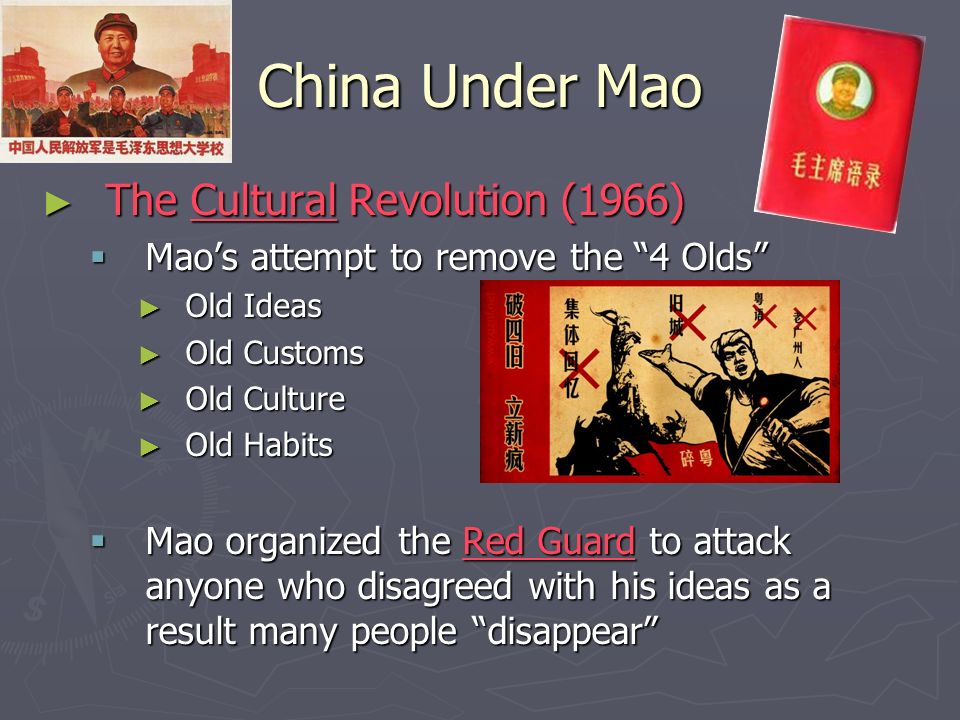
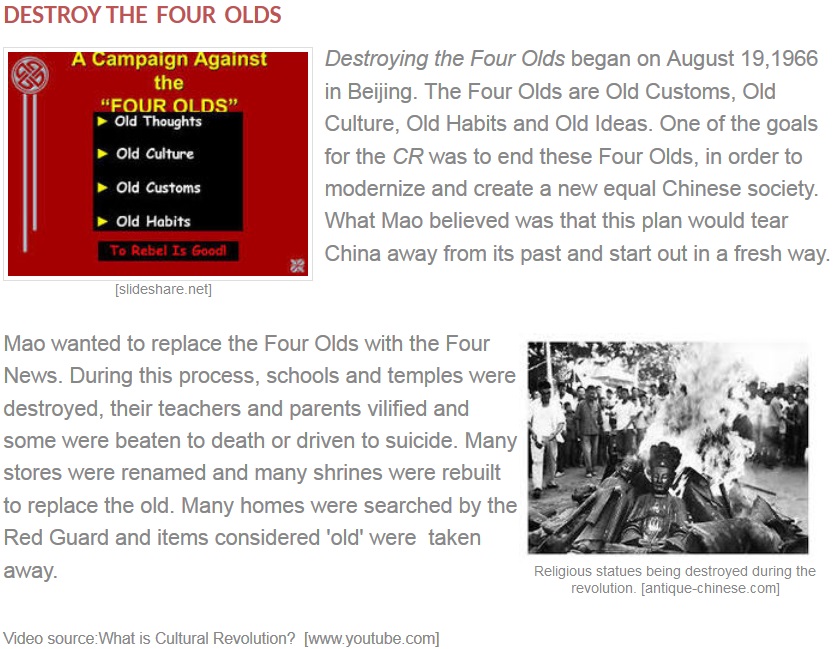

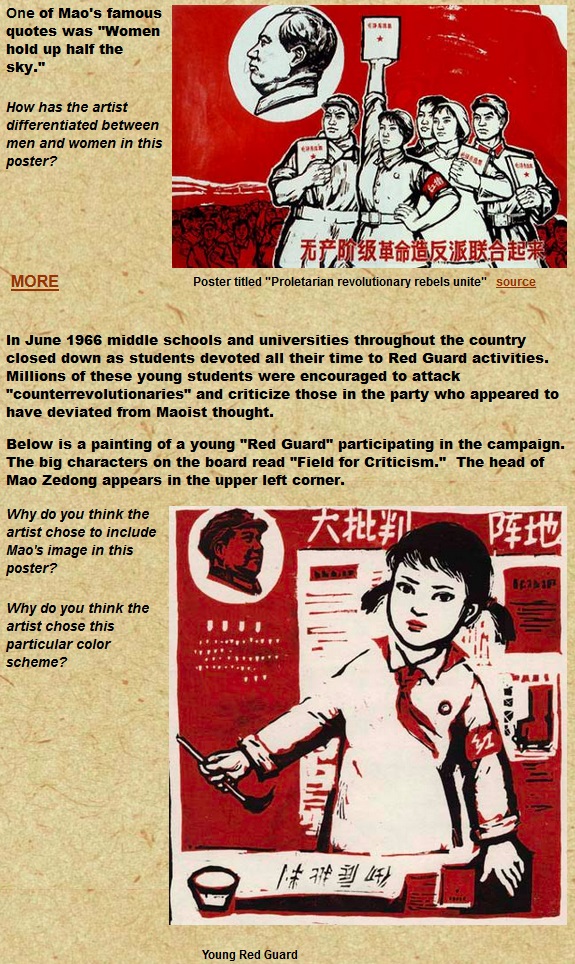
And to achieve this old statues were torn down, smashed and even paraded down the street. Street were renamed. Monuments were defaced. Shops were ransacked. Signs were torn down. Books were burned. Religions were abolished. Tombs were raided. Gulags were constructed. And hundreds of thousands of political / bourgeois / dissenting undesirables were executed.
Note that Mao's permutation of book burning was also a clear historical parallel to classical religious iconoclasm, whereby conquering empires and the like would smash the heathen "icons" (idols) of the defeated culture.
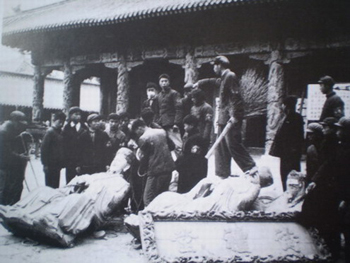
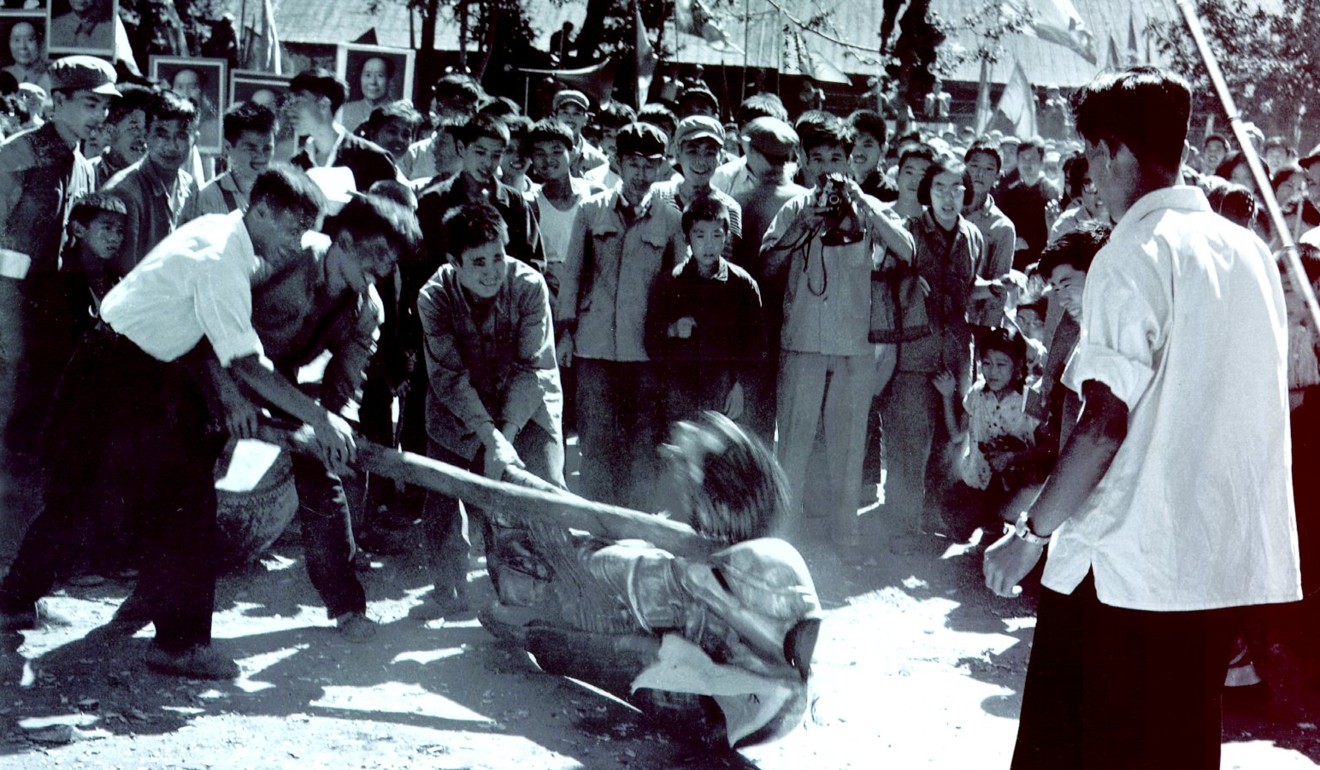
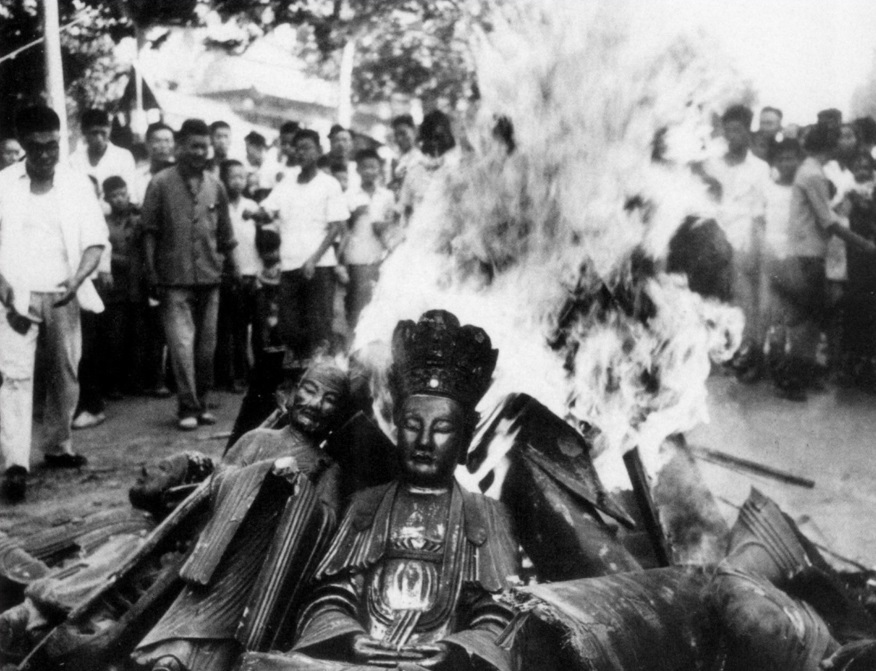
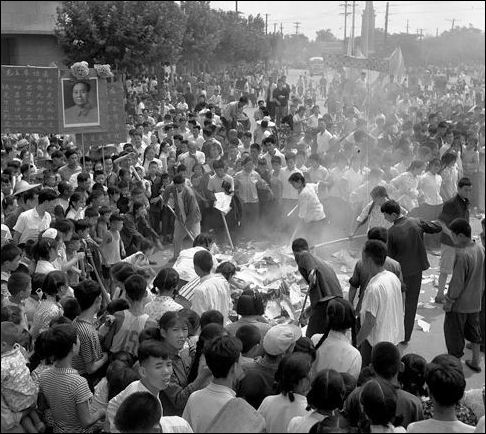
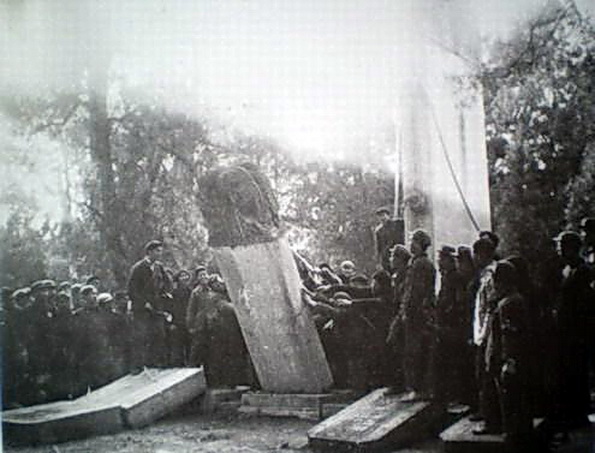
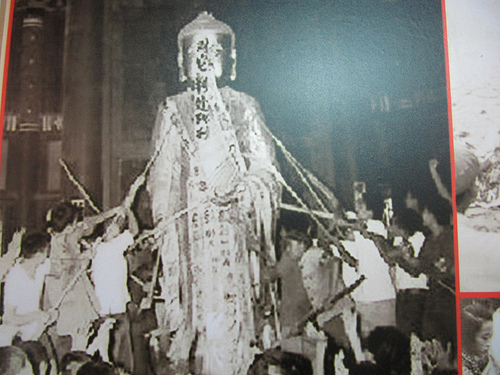
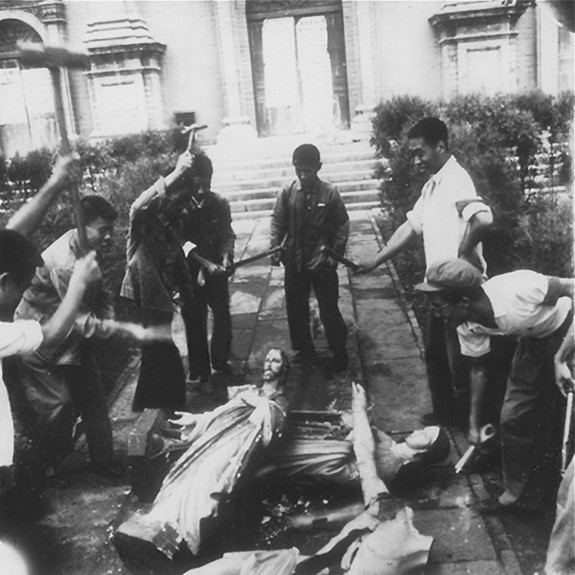
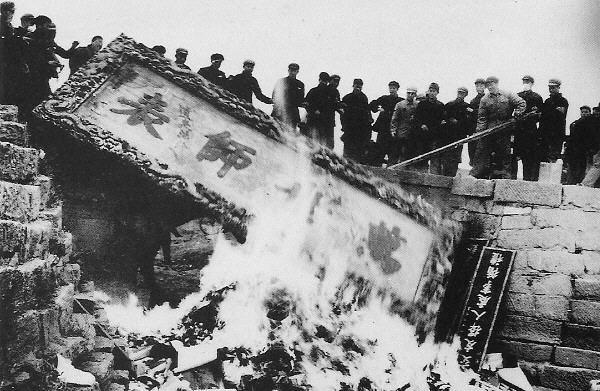
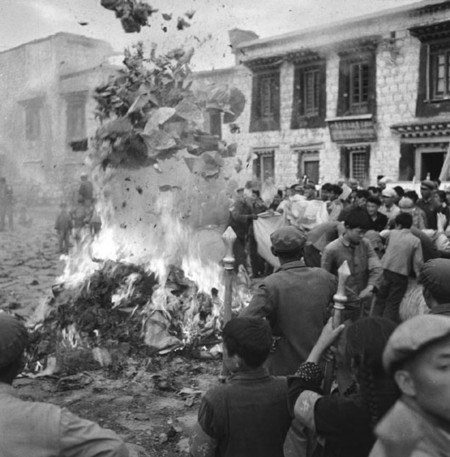
Any of this sound familiar??
ISIS

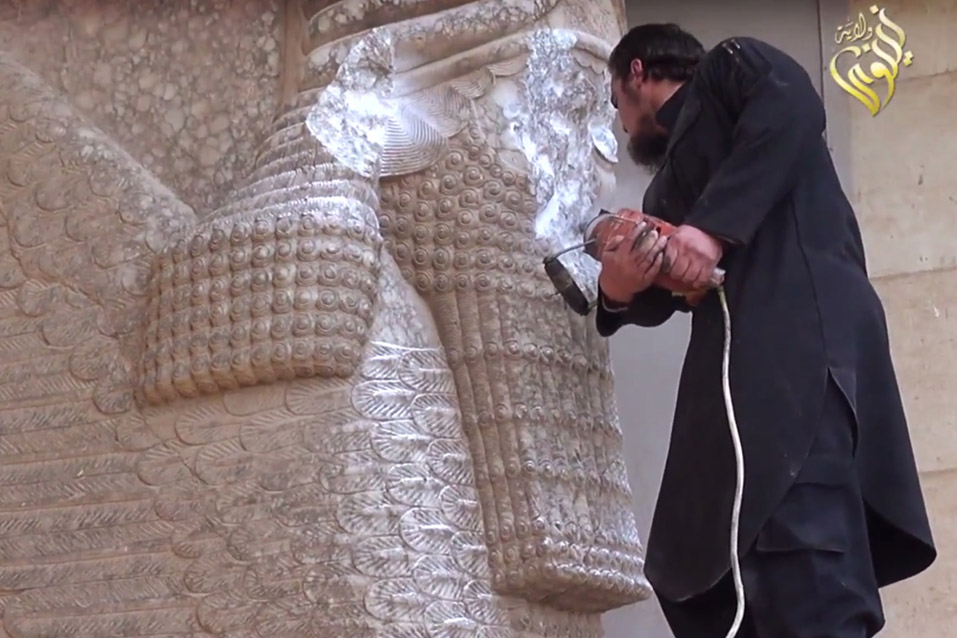




ANTIFA

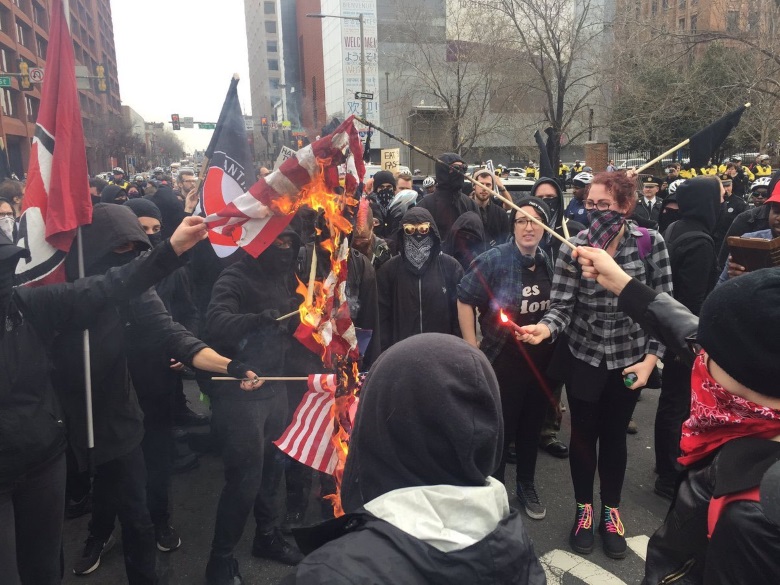
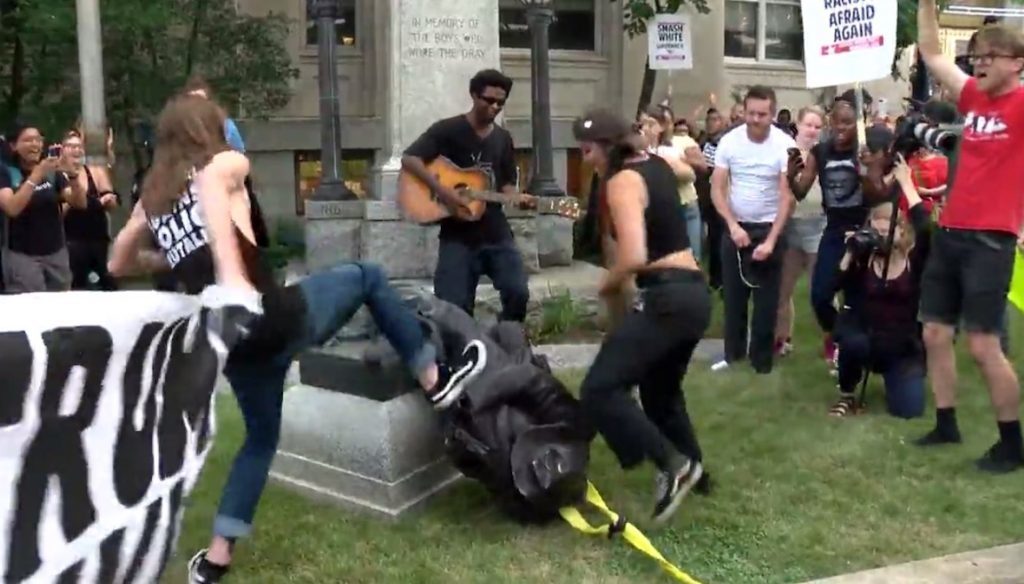
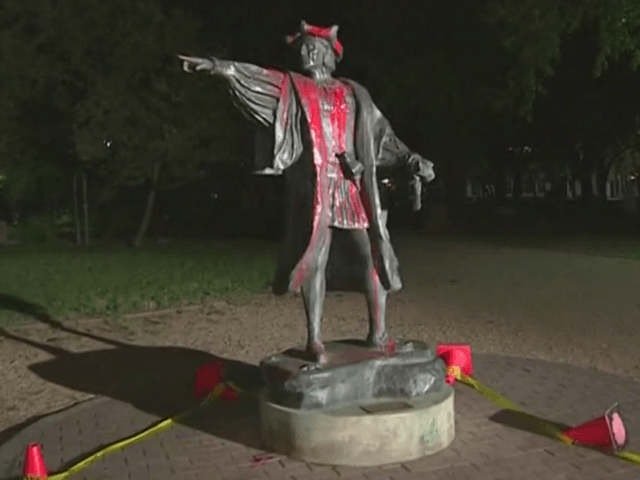
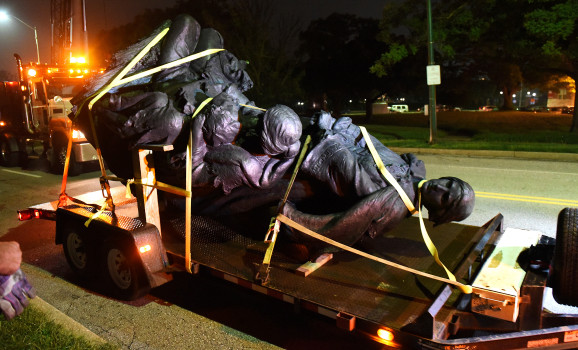




Behold the "Four Olds" aspect of Mao's Cultural Revolution. It was effectively a more grandiose iteration of the Nazi's infamous book burnings style censorship. In China, 1966, Mao (like Hitler before him) organized students into regiments and set them upon the society to rid the culture of that which was unacceptable. The targets of the Maoist's more resembled the efforts of Lenin and Bolchevik's however, as the Nazi's targeted Jewish and "degenerate" influences in their destruction of literature and the arts, while the Communist's each had a more universal "threat": All That Came Before Communism. Effectively, anything that could remind one of life before Communism was to be eradicated, and especially anything to do with bourgeois capitalism.
And so goes the "Four Olds": Old Customs, Old Culture, Old Habits, Old Ideas. Which was to be replaced with the "Four News": New Customs, New Culture, New Habits, New Ideas.




And to achieve this old statues were torn down, smashed and even paraded down the street. Street were renamed. Monuments were defaced. Shops were ransacked. Signs were torn down. Books were burned. Religions were abolished. Tombs were raided. Gulags were constructed. And hundreds of thousands of political / bourgeois / dissenting undesirables were executed.
Note that Mao's permutation of book burning was also a clear historical parallel to classical religious iconoclasm, whereby conquering empires and the like would smash the heathen "icons" (idols) of the defeated culture.









Any of this sound familiar??
ISIS






ANTIFA








edit on 4-11-2017 by IgnoranceIsntBlisss because: (no reason given)
I have just learned something new today, that the Chinese communist took down the statues of slave owning traitors in there country also.
a reply to: dukeofjive696969
The ancients those ISIS have been tearing down were probably all slave owners as well.
If only Antifa could realize they're the minions of the modern plantation owners, out doing their bidding like the provacatuers the robberbarrons would send out to fracture the mounting labor movements of the 1800's / 1900's.
The ancients those ISIS have been tearing down were probably all slave owners as well.
If only Antifa could realize they're the minions of the modern plantation owners, out doing their bidding like the provacatuers the robberbarrons would send out to fracture the mounting labor movements of the 1800's / 1900's.
edit on 4-11-2017 by IgnoranceIsntBlisss because: (no reason given)
originally posted by: dukeofjive696969
I have just learned something new today, that the Chinese communist took down the statues of slave owning traitors in there country also.
Elaborate a little. Because 90% of the statues that were torn down were religious or cultural related. And an entire region was almost wiped off the planet because of this cultural cleansing.
originally posted by: strongfp
originally posted by: dukeofjive696969
I have just learned something new today, that the Chinese communist took down the statues of slave owning traitors in there country also.
Elaborate a little. Because 90% of the statues that were torn down were religious or cultural related. And an entire region was almost wiped off the planet because of this cultural cleansing.
You missed the point by a whole mile, comparing communist china to antifa is funny has hell, one was and still a plague againts humanity and the other more like ants running around triggering people.
a reply to: dukeofjive696969
Okay, so unless Antifa succeeds in their Wannabe Cultural Revolution (WCR) then they shouldn't be compared to a key source of their inspiration, then??
Okay, so unless Antifa succeeds in their Wannabe Cultural Revolution (WCR) then they shouldn't be compared to a key source of their inspiration, then??
originally posted by: IgnoranceIsntBlisss
a reply to: dukeofjive696969
Okay, so unless Antifa succeeds in their Wannabe Cultural Revolution (WCR) then they shouldn't be compared to a key source of their inspiration, then??
They cant succeed, there anarchist at there core, they will implode as those movements always do, true anarchist do not exist anymore, there a water downed version, Well thats how i see it.
a reply to: dukeofjive696969
Since the real agenda behind them and the SJW Movement that effectively spawned them stateside is to fracture our social fabric, they've already succeeded.
Since the real agenda behind them and the SJW Movement that effectively spawned them stateside is to fracture our social fabric, they've already succeeded.
edit on 4-11-2017 by IgnoranceIsntBlisss because: (no reason given)
a reply to: IgnoranceIsntBlisss
I'm a bit confused as to how you can compare the cultural revolution in China with the actions of Antifa.
The Chinese cultural revolution involved millions of people and vast amounts of people banned together to fight against what Mao had claimed to be nefarious capitalists, which had seeped it's way back in to the government and among the people.
Antifa is a bunch of kids that like to get together and break stuff.
Not sure we are making an apt comparison.
I'm a bit confused as to how you can compare the cultural revolution in China with the actions of Antifa.
The Chinese cultural revolution involved millions of people and vast amounts of people banned together to fight against what Mao had claimed to be nefarious capitalists, which had seeped it's way back in to the government and among the people.
Antifa is a bunch of kids that like to get together and break stuff.
Not sure we are making an apt comparison.
originally posted by: IgnoranceIsntBlisss
a reply to: dukeofjive696969
Since the real agenda behind them is to fracture our social fabric, they've already succeeded.
Theres always going to be that fringe movement in all society, its in our nature to build and want to tear down whatever pisses people off.
You seem to have a very apocalyptic view of our times, which is ok to have, i just see us repeating history and doing the same errors again.
a reply to: introvert
Again, scale is supposed to dictate whether or not there's a comparison?
What's happening at universities across the nation is the same BS that went down with China's "Red Guard", the Nazi's "Brownshirts" and Italy's Fascist "Blackshirts".
See image with the words over the brownish background above (with the fancy posters), since you clearly didn't read that part.
Thanks.
Again, scale is supposed to dictate whether or not there's a comparison?
What's happening at universities across the nation is the same BS that went down with China's "Red Guard", the Nazi's "Brownshirts" and Italy's Fascist "Blackshirts".
See image with the words over the brownish background above (with the fancy posters), since you clearly didn't read that part.
Thanks.
a reply to: dukeofjive696969
Yeah?
So this SJW / Antifa BS is the same old same old?
Show some examples please, otheriwse you're just playing apologist for a bunch of goosestepping rabid racist Blackshirt Guard.
Thx.
Yeah?
So this SJW / Antifa BS is the same old same old?
Show some examples please, otheriwse you're just playing apologist for a bunch of goosestepping rabid racist Blackshirt Guard.
Thx.
a reply to: IgnoranceIsntBlisss
What is expunged is the truth or external influence. In the case of Nazi censorship they were destroying anything other than Nazi ideology. In the case of MAO he was eradicating western influence represented by Chiang Kai-shek .
Edit: The Nazis lost because you can't bury the truth forever. The Chinese won because they were resisting external meddling in their internal affairs.
Anyone want the truth of that can read 'Maos little red book'.
(portion redacted)
And so goes the "Four Olds": Old Customs, Old Culture, Old Habits, Old Ideas. Which was to be replaced with the "Four News": New Customs, New Culture, New Habits, New Ideas.
What is expunged is the truth or external influence. In the case of Nazi censorship they were destroying anything other than Nazi ideology. In the case of MAO he was eradicating western influence represented by Chiang Kai-shek .
Edit: The Nazis lost because you can't bury the truth forever. The Chinese won because they were resisting external meddling in their internal affairs.
Anyone want the truth of that can read 'Maos little red book'.
(portion redacted)
edit on 4-11-2017 by intrptr because: (no reason given)
originally posted by: IgnoranceIsntBlisss
a reply to: dukeofjive696969
Yeah?
So this SJW / Antifa BS is the same old same old?
Show some examples please, otheriwse you're just playing apologist for a bunch of goosestepping rabid racist Blackshirt Guard.
Thx.
Oh my, you got triggered on the first page lol.
a reply to: IgnoranceIsntBlisss
It's much more complicated than just the scale.
The people in China formed those groups to fight against their perceived enemies from the direction of the Party and it's leadership itself. The government itself created the "sixteen points" that outlined the purpose and focus of the cultural revolution.
BS.
Humans naturally protest and such on their own, without a dictate from parties or governments, and cannot be compared to the formation of Brownshirts or the Red Guard.
There has not been any mandate from either the government or any party for college students to protest, which they have done for many years without being inspired by Mao's cultural revolution, and there is not a dictate for what they should be protesting.
Are you trying to make the point that any time people get together to protest something they are akin to Red Guards and Brownshirts?
That doesn't prove your point.
Again, scale is supposed to dictate whether or not there's a comparison?
It's much more complicated than just the scale.
The people in China formed those groups to fight against their perceived enemies from the direction of the Party and it's leadership itself. The government itself created the "sixteen points" that outlined the purpose and focus of the cultural revolution.
What's happening at universities across the nation is the same BS that went down with China's "Red Guard", the Nazi's "Brownshirts" and Italy's Fascist "Blackshirts".
BS.
Humans naturally protest and such on their own, without a dictate from parties or governments, and cannot be compared to the formation of Brownshirts or the Red Guard.
There has not been any mandate from either the government or any party for college students to protest, which they have done for many years without being inspired by Mao's cultural revolution, and there is not a dictate for what they should be protesting.
Are you trying to make the point that any time people get together to protest something they are akin to Red Guards and Brownshirts?
See image with the words over the brownish background above (with the fancy posters), since you clearly didn't read that part.
That doesn't prove your point.
a reply to: intrptr
Well the Nazi's went after Jewry, ideology and "degeneracy" (as they saw fit), they didnt try to wipe out their cultural heritage. In fact it was perceived threats to German cultural heritage they were attacking. Their culture they were trying to preserve. Call it nationalism / conservatism. Pretty obvious why Antifa / SJW would hate them as they're more in tune with:
Abolishing history and culture besides the one they're trying to build, like the Soviets & Maoist's had set out for. In both instances it was of course bourgeoisie influences, but also of the relics from their respective previous monarchies. So in both cases essentially thousands of years of cultural artifacts from books to statues to landmarks even, although the SOviet's (from what I've read into so far) were more about print and art and and all that came before Communism were to be shredded, burned or the histories revised.
Well the Nazi's went after Jewry, ideology and "degeneracy" (as they saw fit), they didnt try to wipe out their cultural heritage. In fact it was perceived threats to German cultural heritage they were attacking. Their culture they were trying to preserve. Call it nationalism / conservatism. Pretty obvious why Antifa / SJW would hate them as they're more in tune with:
Abolishing history and culture besides the one they're trying to build, like the Soviets & Maoist's had set out for. In both instances it was of course bourgeoisie influences, but also of the relics from their respective previous monarchies. So in both cases essentially thousands of years of cultural artifacts from books to statues to landmarks even, although the SOviet's (from what I've read into so far) were more about print and art and and all that came before Communism were to be shredded, burned or the histories revised.
From my mega-thread "CENSORSHIP: The Universal Language of Dictators":
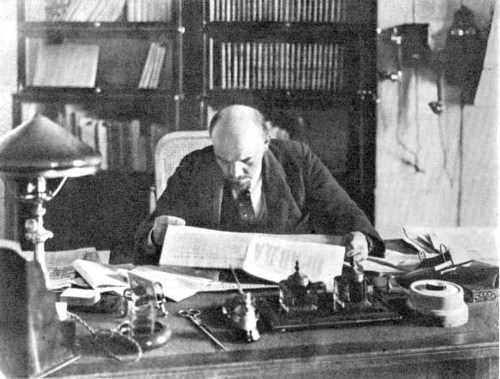
Censorship Under Vladimir Lenin (1917-1924):
The Russian Revolution started 'it all' for the global rise of Socialism & Communism. It went on to prove how 'pure Socialism' (Communism) has to be enforced to make everyone in a large system comply, and that enforcement begins with censorship. From there the formula is simple really: the more 'pure' the Communism the most Total the brutal Authoritarianism required to establish and maintain it. One of the first precedents they had to enact was revising their own history, to which ends destroying pre-Communist literature was the model. It only went downhill from there of course, especially the more 'pure' system that followed Lenin's death.

Censorship Under Vladimir Lenin (1917-1924):
Freedom of the press’ in bourgeois society means freedom for the rich systematically, unremittingly, daily, in millions of copies, to deceive, corrupt and fool the exploited and oppressed mass of the people, the poor.
-Lenin
The Russian Revolution started 'it all' for the global rise of Socialism & Communism. It went on to prove how 'pure Socialism' (Communism) has to be enforced to make everyone in a large system comply, and that enforcement begins with censorship. From there the formula is simple really: the more 'pure' the Communism the most Total the brutal Authoritarianism required to establish and maintain it. One of the first precedents they had to enact was revising their own history, to which ends destroying pre-Communist literature was the model. It only went downhill from there of course, especially the more 'pure' system that followed Lenin's death.
Socialism and communism are alike in that both are systems of production for use based on public ownership of the means of production and centralized planning. Socialism grows directly out of capitalism; it is the first form of the new society. Communism is a further development or "higher stage" of socialism. www.marxmail.org...
Destruction of printed matter
The Soviet government implemented mass destruction of pre-revolutionary and foreign books and journals from libraries. Only "special collections" (spetskhran), accessible by special permit granted by the KGB, contained old and politically incorrect material.[2] Towards the end of Soviet rule, perestroika led to loosened restrictions on information and publishing. Soviet books and journals also disappeared from libraries according to changes in Soviet history. Often Soviet citizens preferred to destroy politically incorrect publications and photos, because those connected to them frequently suffered persecution. en.wikipedia.org...
Lenin’s Theory of the Press
The “ultimate mastermind” behind the Bolsheviks’ power was Vladimir Ulyanov, better known by his nom de guerre, Lenin. For the future development of Russia, perhaps no-one has been as influential. For Lenin, the party press was an integral part of the party apparatus and firmly linked with its organizational and agitational function. In the famous passage in Where to Begin?, an article published in Iskra, Lenin stresses that a newspaper “is not only a collective propagandist and a collective agitator, it is also a collective organizer.” (Lenin [1901].)
...
The origins of Lenin’s theory of the press have to be seen as lying in general traditions of the socialist movement (Sparks 1998, 47). Lenin did not study only the works of German Marxists. Lenin’s media strategy was worked out on the experience of the Paris Commune of 1871. In Lenin’s view, the leaders of the Commune did not undertake tough enough measures against the opposition press, and failed entirely at the time with their own counter-propaganda. Therefore, the Commune was defeated. Lenin envisaged the closure of alien publications as a priority for Bolsheviks after seizing power, to prevent a repetition of the situation which led to the collapse of the Paris Commune. (Strovsky and Simons 2007, 4.) The Bolsheviks headed firmly towards socialism and they did not want that anything would stop them. They had a revolution to make.
...
Many of the measures were very probably meant to be only temporary, and to be lifted when ”the time is right” and the society is more stable. The Bolshevik power relied on political censorship (which could be considered originating from the second and third “elements” described above). Political censorship can be considered the strongest form of censorship in a sense that political power can lay down restrictions which affect the society as a whole. Still, moral censorship (here manifesting itself as the first of the “elements”) is the one that really controls people’s minds. It is not so visible than the political form of censorship, however important. On the one hand, censorship is suppression: the control of official powers on content, release and distribution of printing products so that ominous ideas could not be accepted by society. On the other hand, censorship is one of institutionalization of human culture: an attribute of the relationship between the state and the public.
The influences affecting Bolsheviks attitudes and practices on censorship could be arranged in three underlying “elements” that the Bolshevik censorship laid its foundations on:
(1) First, the Russian, historical element: the censorship by the tsarist regime, the conventions, the structures Bolsheviks inherited from the old regime, and social traditions.
(2) The second element in Bolsheviks’ censorship was ideological, namely Socialist element. It presented a change towards the previous practices. Ideologically, the Bolsheviks were strongly influenced by the Social Democratic Party of Germany and its organizational practices and principles.
(3) The third element is circumstantial, the practices developed in the wartime, and the need to hold the power – the measures needed to save the revolution. ottimistaperlavolonta.wordpress.com... -in-russia/
Censorship in the Soviet Union was pervasive and strictly enforced. Censorship was performed in two main directions:
-State secrets were handled by the General Directorate for the Protection of State Secrets in the Press (also known as Glavlit), which was in charge of censoring all publications and broadcasting for state secrets
-Censorship, in accordance with the official ideology and politics of the Communist Party was performed by several organizations:
>Goskomizdat censored all printed matter: fiction, poetry, etc.
>Goskino, in charge of cinema
>Gosteleradio, in charge of radio and television broadcasting
>The First Department in many agencies and institutions, such as the State Statistical Committee (Goskomstat), was responsible for assuring that state secrets and other sensitive information only reached authorized hands.
en.wikipedia.org...
From my mega-thread "CENSORSHIP: The Universal Language of Dictators":
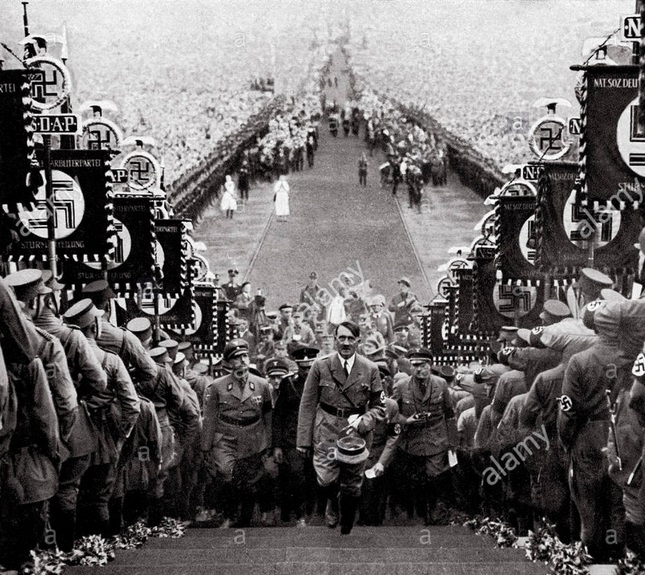
Censorship Under Adolf Hitler (1934-1945):
Nazi era propaganda & censorship is likely the most well studied in general, and described on TV. Indeed, one can hardly envision a historical diorama of propaganda & censorship without figurines wearing Nazi uniforms being present in the exhibit. In the past, when viewing Third Reich documentaries, I've always slanted my perception bias around studying Nazi propaganda techniques. For this project I reviewed many documentaries with censorship being my focus, and to my own surprise it turns out censorship itself played a major role in the very origins of the rise of Nazism.
Nazism being a sort of spawn of censorship came in two forms. First, it was World War 1 propaganda & censorship that had the German people with the false impression of being on the verge of victory when all the sudden, to the shock of the entire nation, came out of no where a swift surrender and humiliating defeat. Given the shock we've all witnessed this year post-election, with the Hillary supporters rioting and having cry-ins, this all sounds familiar. Second, after Hitler's early failed coup attempt, for a few years he was banned from public speaking. He went on to use this very well-deserved censorship in his rise to power martyrdom speeches. What irony there, that censorship would promptly become a mainstay of the Nazi Propaganda Model.
Once the Nazi's were in power, their censorship is mostly similar to the summary of Soviet censorship, although more in tune with Nazi's unique 'architecture of aggression' style. Aside from 'style points', the other key difference between Nazi & Soviet censorship & propaganda is their obsession with Identity Politics.
They pioneered Identity Politics, compared to anything that came before it (which unfortunately has been mimicked on occasion since). Many would quickly point out their obsessive racism, but that was only one key plank of the Nazi Social Identity Model (NSIM). Where before them nations and groups would stress group identities around nationality, or religion, or political party, or race, the Nazi's merged all of these core identities into one. I've still yet to see a description of this model put into such plain terms, but I've been harping and warning about this practice [url=http://www.abovetopsecret.com/forum/thread284451/pg1]for about a decade.

Censorship Under Adolf Hitler (1934-1945):
The great masses of the people will more easily fall victims to a big lie than to a small one.
-Hitler
Nazi era propaganda & censorship is likely the most well studied in general, and described on TV. Indeed, one can hardly envision a historical diorama of propaganda & censorship without figurines wearing Nazi uniforms being present in the exhibit. In the past, when viewing Third Reich documentaries, I've always slanted my perception bias around studying Nazi propaganda techniques. For this project I reviewed many documentaries with censorship being my focus, and to my own surprise it turns out censorship itself played a major role in the very origins of the rise of Nazism.
The Nazi Party began building a mass movement. From 27,000 members in 1925, the Party grew to 108,000 in 1929. The SA was the paramilitary unit of the Party, a propaganda arm that became known for its strong arm tactics of street brawling and terror. The SS was established as an elite group with special duties within the SA, but it remained inconsequential until Heinrich Himmler became its leader in 1929. By the late twenties, the Nazi Party started other auxiliary groups. The Hitler Youth, the Student League and the Pupils' League were open to young Germans. The National Socialist Women's League allowed women to get involved. Different professional groups--teachers, lawyers and doctors--had their own auxiliary units.
... Party propaganda proved effective at winning over university students, veterans' organizations, and professional groups, although the Party became increasingly identified with young men of the lower middle classes. fcit.usf.edu...
Nazism being a sort of spawn of censorship came in two forms. First, it was World War 1 propaganda & censorship that had the German people with the false impression of being on the verge of victory when all the sudden, to the shock of the entire nation, came out of no where a swift surrender and humiliating defeat. Given the shock we've all witnessed this year post-election, with the Hillary supporters rioting and having cry-ins, this all sounds familiar. Second, after Hitler's early failed coup attempt, for a few years he was banned from public speaking. He went on to use this very well-deserved censorship in his rise to power martyrdom speeches. What irony there, that censorship would promptly become a mainstay of the Nazi Propaganda Model.
Once the Nazi's were in power, their censorship is mostly similar to the summary of Soviet censorship, although more in tune with Nazi's unique 'architecture of aggression' style. Aside from 'style points', the other key difference between Nazi & Soviet censorship & propaganda is their obsession with Identity Politics.
Degenerate Art
Degenerate art (German: Entartete Kunst) was a term adopted by the Nazi regime in Germany to describe Modern art. Such art was banned on the grounds that it was un-German, Jewish, or Communist in nature, and those identified as degenerate artists were subjected to sanctions. These included being dismissed from teaching positions, being forbidden to exhibit or to sell their art, and in some cases being forbidden to produce art.
Nazi anti-Jewish policy functioned on two primary levels: legal measures to expel the Jews from society and strip them of their rights and property while simultaneously engaging in campaigns of incitement, abuse, terror and violence of varying proportions. There was one goal: to make the Jews leave Germany.
...
Ceremonial public book burnings took place throughout Germany. Many books were torched solely because their authors were Jews. The exclusion of Jews from German cultural life was highly visible, ousting their considerable contribution to the German press, literature, theater, and music.
...
Jews were banned from universities; Jewish actors were dismissed from theaters; Jewish authors’ works were rejected by publishers; and Jewish journalists were hard-pressed to find newspapers that would publish their writings. Famous artists and scientists played an important role in this campaign of dispossession and party labeling of literature, art, and science. Some scientists and physicians were involved in the theoretical underpinnings of the racial doctrine. www.yadvashem.org...
They pioneered Identity Politics, compared to anything that came before it (which unfortunately has been mimicked on occasion since). Many would quickly point out their obsessive racism, but that was only one key plank of the Nazi Social Identity Model (NSIM). Where before them nations and groups would stress group identities around nationality, or religion, or political party, or race, the Nazi's merged all of these core identities into one. I've still yet to see a description of this model put into such plain terms, but I've been harping and warning about this practice [url=http://www.abovetopsecret.com/forum/thread284451/pg1]for about a decade.
If you guys want to learn more about China in general, Franklin Ellis has the complete slide show
containing some of the slides from this OP. Some interesting facts about China you may or may not have heard before!
new topics
-
HHS Spent Hundreds of Millions of Dollars on DEI Initiatives Under Biden, Watchdog Finds
US Political Madness: 5 minutes ago -
Breaking: FBI Agents Raid Polymarket CEO After Betting Site Predicts Trump Win
General Conspiracies: 9 minutes ago -
The Guardian quits Elon Musk's X social media platform
Mainstream News: 59 minutes ago -
Thune selected as Senate Republican Leader
US Political Madness: 3 hours ago -
Band of Brothers 2001 Classic
Television: 3 hours ago -
US warship Edsall Lost after Pearl Harbor Attack Found 80 Years Later ... by Accident
Mainstream News: 4 hours ago -
WATCH LIVE: US Congress hearing on UFOs, unidentified anomalous phenomena
Aliens and UFOs: 6 hours ago -
Worlds Behind You…
Short Stories: 6 hours ago -
Con Man Don
Jokes, Puns, & Pranks: 6 hours ago -
How can you defend yourself when the police will not tell you what you did?
Posse Comitatus: 10 hours ago
top topics
-
How can you defend yourself when the police will not tell you what you did?
Posse Comitatus: 10 hours ago, 15 flags -
US warship Edsall Lost after Pearl Harbor Attack Found 80 Years Later ... by Accident
Mainstream News: 4 hours ago, 11 flags -
The Guardian quits Elon Musk's X social media platform
Mainstream News: 59 minutes ago, 9 flags -
Thune selected as Senate Republican Leader
US Political Madness: 3 hours ago, 8 flags -
Band of Brothers 2001 Classic
Television: 3 hours ago, 6 flags -
WATCH LIVE: US Congress hearing on UFOs, unidentified anomalous phenomena
Aliens and UFOs: 6 hours ago, 6 flags -
Worlds Behind You…
Short Stories: 6 hours ago, 4 flags -
Breaking: FBI Agents Raid Polymarket CEO After Betting Site Predicts Trump Win
General Conspiracies: 9 minutes ago, 2 flags -
HHS Spent Hundreds of Millions of Dollars on DEI Initiatives Under Biden, Watchdog Finds
US Political Madness: 5 minutes ago, 1 flags -
Con Man Don
Jokes, Puns, & Pranks: 6 hours ago, 0 flags
active topics
-
How can you defend yourself when the police will not tell you what you did?
Posse Comitatus • 51 • : SprocketUK -
The Trump effect 6 days after 2024 election
2024 Elections • 101 • : xuenchen -
President-Elect DONALD TRUMP's 2nd-Term Administration Takes Shape.
Political Ideology • 156 • : matafuchs -
HHS Spent Hundreds of Millions of Dollars on DEI Initiatives Under Biden, Watchdog Finds
US Political Madness • 0 • : xuenchen -
Breaking: FBI Agents Raid Polymarket CEO After Betting Site Predicts Trump Win
General Conspiracies • 1 • : LetsGoViking -
WATCH LIVE: US Congress hearing on UFOs, unidentified anomalous phenomena
Aliens and UFOs • 23 • : Lazy88 -
Thune selected as Senate Republican Leader
US Political Madness • 41 • : marg6043 -
DEI is getting pummled
Other Current Events • 13 • : xuenchen -
The Guardian quits Elon Musk's X social media platform
Mainstream News • 7 • : onestonemonkey -
US warship Edsall Lost after Pearl Harbor Attack Found 80 Years Later ... by Accident
Mainstream News • 11 • : firerescue
